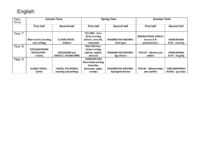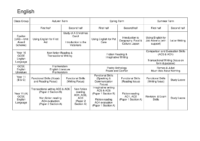English
Curriculum Intent
Our English curriculum is designed to inspire an enjoyment of language and literature. It is a curriculum adapted to suit the needs of deaf learners, giving them the opportunity to study a wide range of authors and genres, and explore their creativity, whilst also maintaining a focus on building vocabulary, developing greater fluency in reading and promoting accuracy in writing.
Students’ creativity and imagination are promoted and developed through creative writing and drama. Through the study of different novels, plays, poems and non-fiction texts, students build on their cultural capital as they explore a range of perspectives and cultures.
The development of the functional aspects of language are promoted through reading, writing, and communication, which equips students with literacy skills to enhance their access to further education and the wider world.
By the end of Key Stage 3, students will:
- have studied a broad range of both fiction and non-fiction reading.
- have begun to develop critical thinking skills and analytical skills.
- be able to express their ideas appropriately.
By the end of Key Stage 4, students will:
- have the skills and confidence to access the world around them.
- be able to express their ideas confidently and independently.
- will have developed critical thinking skills and analytical skills and studied the content specified by their exam board to achieve the best of their abilities.
Students are grouped according to their ability and degree of individual literacy development. The groups follow the Key Stage 3 Programme of Study for English, with some classes following an adapted curriculum to suit their learning needs, which ensures on-going skill development in speaking and listening, reading, and writing. The programme includes the study of a wide range of fiction and non-fiction. Students study whole books, short stories, poems and plays with a wide coverage of genres. This includes poetry, contemporary and heritage texts, and two Shakespeare plays.
Students gain confidence in communicating and writing for a wide range of purposes and audiences and will also begin to approach English creatively, making connections between ideas and texts and playing with language in an imaginative way. Through English lessons, students will consolidate and build upon their knowledge of grammar, vocabulary and how meaning is shaped through language, both written and spoken. Students are also encouraged to choose and read books independently for interest and enjoyment through the Accelerated Reader, Rapid Reader and Oxford Reading Tree programmes.



